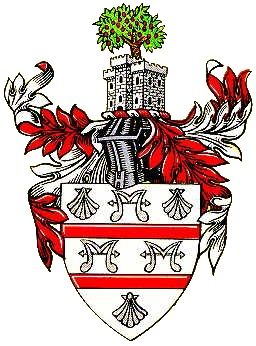South Westmorland: Difference between revisions
Knorrepoes (talk | contribs) m (Text replacement - "====Origin/meaning====" to "===Origin/meaning===") |
Knorrepoes (talk | contribs) m (Text replacement - "[[Category:England" to "50 px|link=United Kingdom[[Category:England") |
||
| Line 25: | Line 25: | ||
[[Category:United Kingdom Municipalities S]] | [[Category:United Kingdom Municipalities S]] | ||
[[Category:England]] | [[File:england.jpg|50 px|link=United Kingdom]][[Category:England]] | ||
[[Category:Granted 1955]] | [[Category:Granted 1955]] | ||
Revision as of 15:00, 9 December 2017
| Heraldry of the World |
| British heraldry portal Civic heraldry of the United Kingdom |
|
SOUTH WESTMORLAND
Incorporated into : 1974 South Lakeland
Official blazon
Arms : Argent two Barrulets Gules in chief a Water Bouget between two Escallops in fesse two Water Bougets and in base an Escallop Sable.
Crest : On a Wreath of the Colours issuant from the Battlements of a representation of a Pele Tower Argent masoned Sable a Damson Tree fructed proper.
Origin/meaning
The arms were officially granted on December 20, 1955.
The two red bars are from the arms of the de Lancaster family, Barons of Kendal. I have no information on the other elements, all information is welcome !
Pele towers are small fortified keeps or tower houses, built along the English and Scottish Borders, intended as watch towers where signal fires could be lit by the garrison to warn of approaching danger.
The tree is a Westmorland damson, a member of the plum family. They grow mainly in and around the Lyth and Winster valleys, south-west of Kendal in the English Lake District. The orchards of the Lyth Valley are unique, surrounding each small farmstead and growing along every hedgerow in the valley. Damsons were not only eaten as fruit, but were used in the textile industry as a source of dye.
Contact and Support
Partners:
Your logo here ?
Contact us
© since 1995, Heraldry of the World, Ralf Hartemink 
Index of the site
Literature : Information from here













